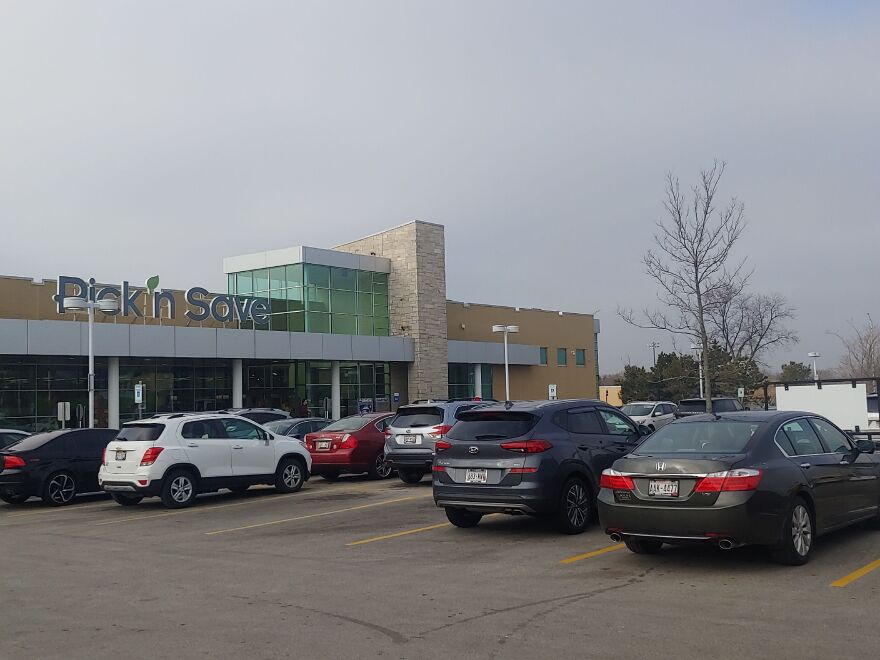The biggest financial help from the federal government during the COVID-19 pandemic passed the U.S. Senate Wednesday night. A House vote on the $2 trillion coronavirus stimulus package may come Friday. President Trump is promising to sign the measure that his administration helped craft.
But Wisconsin and national economists say the financial and unemployment crunch will still likely get worse before it gets better.
>>The Latest WUWM & NPR Coronavirus Coverage
Grocery stores are one type of business allowed to stay open during the state of Wisconsin public health emergency triggered by COVID -19. At a Pick 'n Save in Glendale on Wednesday, there were signs of normalcy: A worker pushed a string of grocery carts through the front door. Other workers stocked shelves. There were shoppers inside the store.
Pick 'n Save, owned by the giant corporation Kroger, is expected to survive what some economists are calling a “contraction” of the economy.
But many smaller businesses are closed either by order of the state as nonessential or due to declining demand. Tens of thousands of Wisconsin residents are filing new unemployment claims. Nationwide, hundreds of thousands, maybe a few million people, have been laid off.
"Typically, when you see weakness, the encouragement is to go out and spend more. Right now, we're kind of purposely being told to kind of spend less."
This week, the Milwaukee-based investment firm Baird issued a “Market Note” with a sobering forecast that said things may not get better for weeks or months. Investment strategist Willie Delwiche helped write the analysis. He says this is one pullback that consumer spending may not be able to quickly reverse.
“I say it’s ironic because typically, when you see weakness, the encouragement is to go out and spend more. Right now, we’re kind of purposely being told to kind of spend less, to do less, to stay at home," Delwiche said.
Delwiche says less consumption and limited movement are especially hurting the entertainment and service sectors –places like music and sports venues, hotels, bars and restaurants. Also, some transportation companies like airlines report financial difficulties.

Retired Milwaukee Area Technical College economist Michael Rosen says the economy is in freefall. He says many of those out of work weren’t paid very much to begin with.
“They live paycheck to paycheck. So, as soon as they were laid off, these people were hurting, and hurting badly. Then, once the pandemic spread, manufacturing began to shut down as well. Those workers are also generally working people who have very little to fall back on," Rosen said.
If it becomes law, the huge federal stimulus package is expected to temporarily help many businesses, as well as those laid off. There may also be a six-month break for those who have to repay federal student loans. Rosen says many of those loan recipients also work — or did.
“These are students who have lost their jobs. So, they’ve lost their income, and they live on the precipice when they’re working,” he said.

Elsewhere, the U.S. Small Business Administration recently announced economic distress loans are available for many firms, and The Federal Reserve has cut interest rates and is promising other aggressive efforts to eventually promote what it calls “a swift recovery.”
Locally, businesses are trying new things. As one of many examples, Milwaukee’s East Side and Downer Avenue Business Improvement Districts have created new web pages to promote buying gift cards, ordering carryout or delivery from restaurants, and contributing to staff economic relief funds.
At Baird, Willie Delwiche is advising investors to be patient. The stock market is up for the week after dropping for most of March. But he says it’s best to stick with a plan.
For people without the money to invest, and perhaps even worried about paying their April rent, Delwiche says, “Contact — whether it’s landlords, or banks you have outstanding loans with. Work with them. That’s been one of the themes from the Fed over the last couple weeks is, they’re doing what they can to supply liquidity to banks with the understanding that banks will do what they can to help borrowers.”

But the economic wildcard still appears to be the coronavirus, and what any additional spread could do to the businesses still open. The grocery chain Sendik’s announced Wednesday that it’s installing plexiglass shields at checkout lanes to better protect frontline employees and customers. So is Metcalfe’s in Wauwatosa and Outpost Natural Foods.
Outpost also warns that closing or limiting service to pick-up could be considered if shoppers don’t adjust their social distancing and other behaviors. Meijer stores joined Outpost in asking customers to refrain from bringing in reusable bags.
During this pandemic, WUWM's Bubbler Talk is focusing on the coronavirus and its impact on the Milwaukee area. If you have a question, submit it below.
_






